Mailchimp Review
Mailchimp is an all-in-one marketing platform known for its email marketing features. It lets businesses design, automate, and manage email campaigns easily, using customizable templates and tools for A/B testing and segmentation to improve engagement.
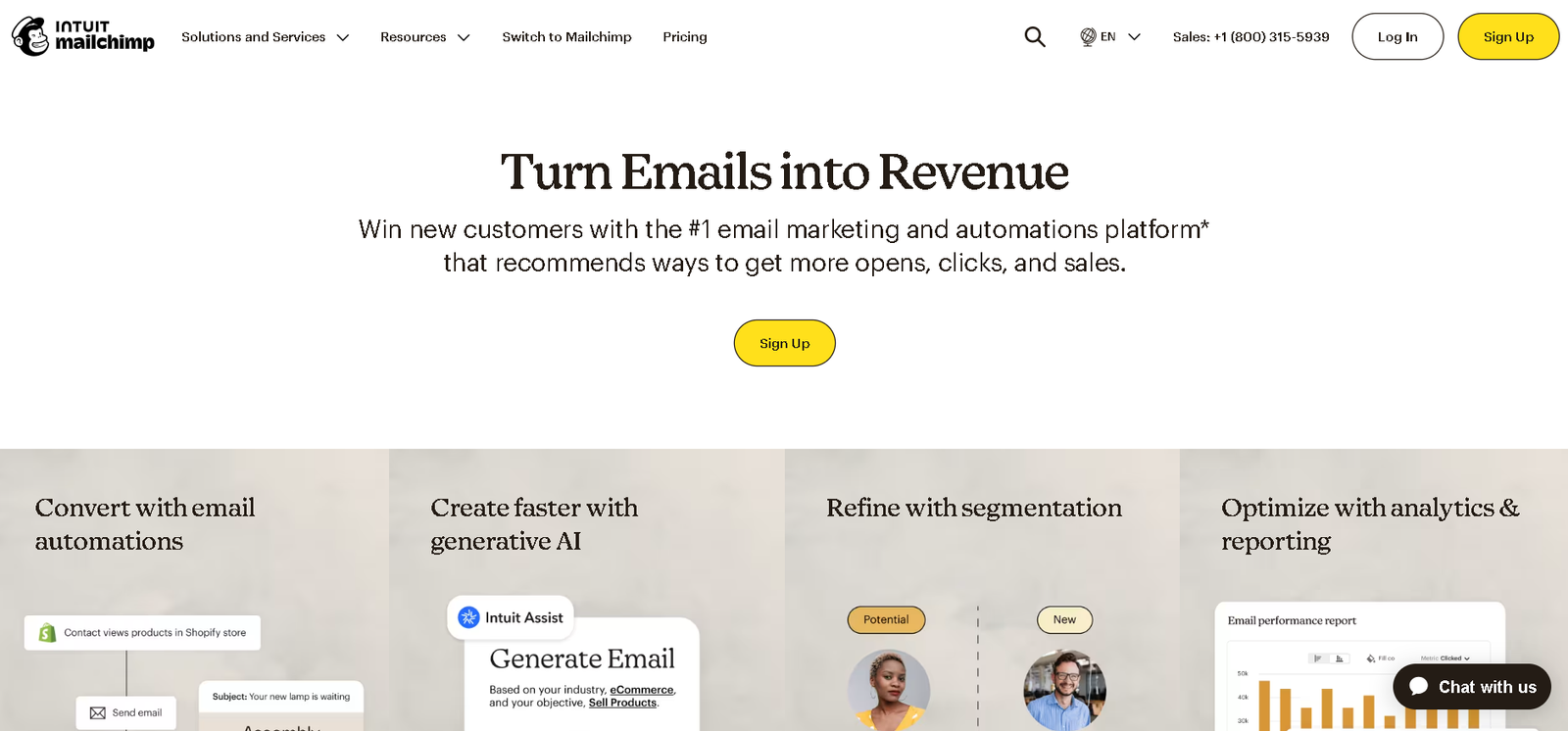
Over time, Mailchimp has expanded to include social media ads, landing pages, and marketing automation. Its audience management tools allow businesses to track customer behavior and run targeted campaigns across various channels.
Mailchimp also offers detailed analytics to monitor campaign performance and audience engagement. It integrates with many e-commerce and CRM platforms, making it a flexible solution for businesses of all sizes.
4.6
Pricing
Free ₹0
Essentials ₹1088
Standard ₹1673
Key Features
Email Templates ✓
A/B Testing ✓
Marketing Automation ✓
Survey ✓
Image Library ✓
Ranked 5 from 29 Email Marketing Services
Performance: |4.9|
Mailchimp is known for its robust email marketing features, including automation, segmentation, and analytics. The platform generally performs well with high email deliverability rates, making it effective for reaching audiences.
Uptime: |4.9|
Mailchimp typically maintains a strong uptime record, with services often available 99.9% of the time. They provide a status page to inform users of any outages or maintenance updates.
Customer Service: |4.8|
Mailchimp offers a variety of customer support options, including email support, live chat, and a comprehensive knowledge base. However, response times can vary depending on the plan you choose.
Pricing: |4.7|
Mailchimp’s pricing is tiered based on features and the size of your email list. They offer a free plan with basic features, while paid plans provide advanced functionalities such as automation, custom branding, and detailed analytics. The pricing can range from a low monthly fee for basic plans to higher costs for larger lists and additional features.

Overview
Category | Details |
Founded | 2001 by Ben Chestnut, Mark Armstrong, Dan Kurzius |
Services Offered | Email marketing, automation, CRM, segmentation, landing pages, ads, social posts, A/B testing, analytics |
Pricing | – Free: $0 (500 contacts) – Essentials: $13/month (500 contacts) – Standard: $20/month (500 contacts) – Premium: $350/month (10,000 contacts) |
Customer Support | – Free: Email – Paid: Email & chat – Premium: Phone support |
Ease of Use | Simple interface, drag-and-drop builder, templates; beginner and advanced friendly |
Performance | Good deliverability, strong automation, scalable |
Reputation | Popular and trusted, with users from small to large businesses; some find higher-tier plans expensive |
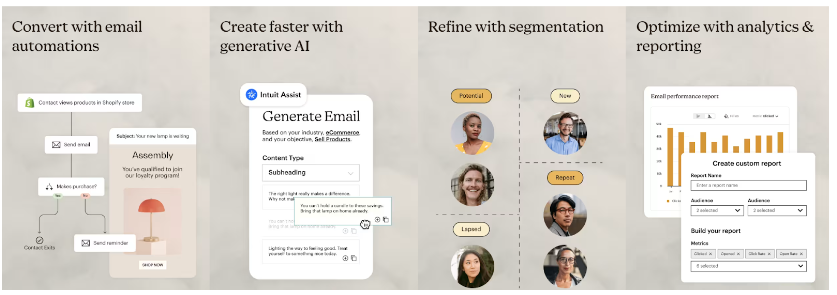
More Than Just a Big Name?
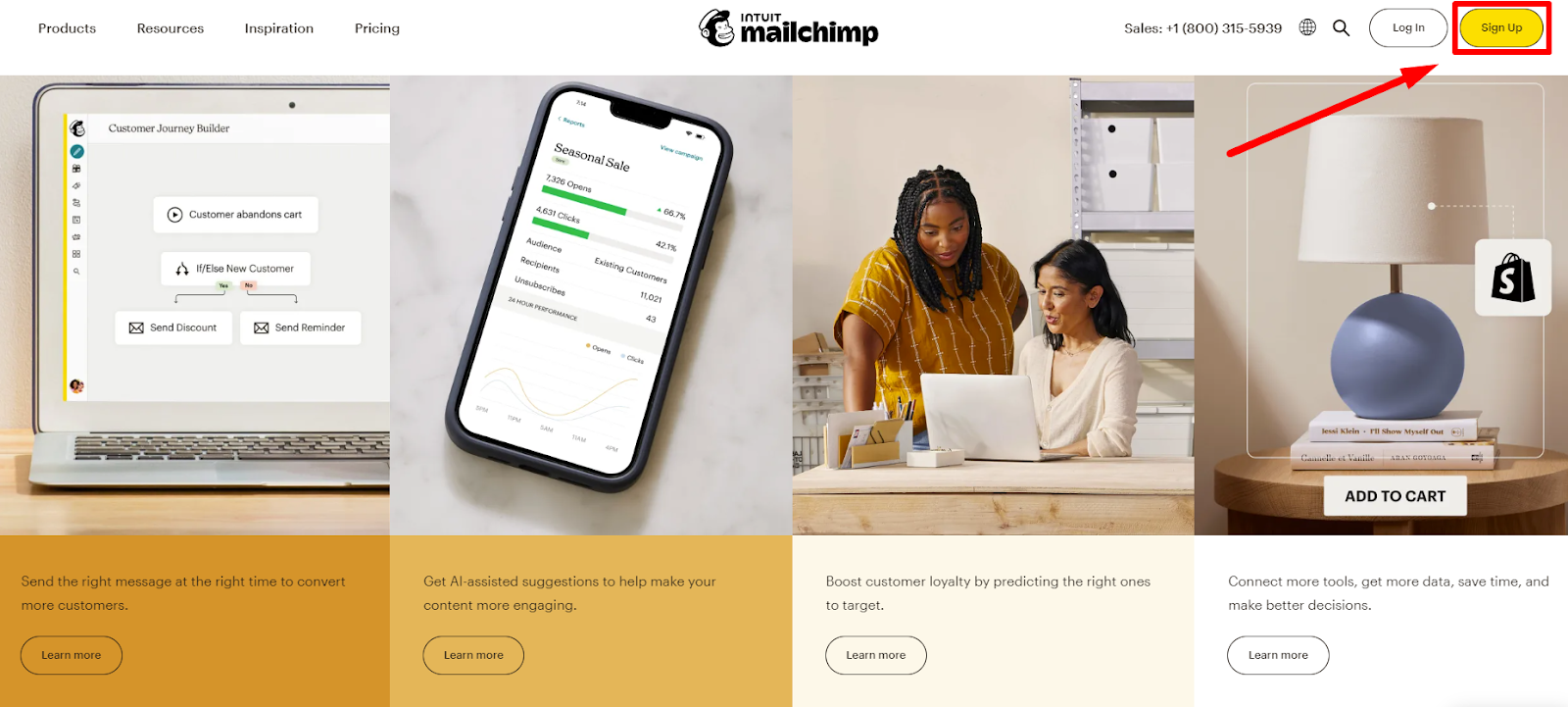
Mailchimp is one of the top names in email marketing—and for good reason. The platform has clearly been designed with ease of use in mind, making it a great option if you need a fast and efficient way to launch email marketing campaigns.
It’s a well-rounded tool that performs reliably across various areas. After signing up, I was able to import my contacts, create my first email, and send it to my subscribers in under an hour.
For those new to email marketing, Mailchimp offers a generous free plan, allowing you to send emails, build forms, and create unlimited landing pages. If you’re looking for more advanced features like personalization, segmentation, and automation, these are available with the platform’s paid plans.
While Mailchimp’s features may not be as robust as some of its top competitors, its email marketing tools are highly functional, visually appealing, and user-friendly. Keep reading to see if Mailchimp is the right email marketing service for you.
What Is Mailchimp
Mailchimp is a marketing automation platform designed for managing email marketing campaigns. It allows businesses and individuals to create, send, and analyze email newsletters and marketing efforts.
Who Is It For?
Small Businesses: Ideal for those looking to grow their customer base through effective email marketing.
E-commerce Stores: Helps online retailers promote products and engage customers.
Nonprofits: Useful for organizations to keep supporters informed and engaged.
Content Creators and Bloggers: Allows individuals to share updates and content with their audience.
Marketers: Provides tools for campaign management and analysis.
FEATURES |4.5| 




| 💯 Free plan | Yes |
| 💲 Starting price | ₹1088 |
| ⚙️ Automations | Yes |
| 💬 Live chat support | Yes |
Email Campaigns: Design and send customizable email marketing campaigns with templates and personalization tools.
Marketing Automation: Automate marketing workflows, such as email series and customer follow-ups.
Audience Management: Segment your audience based on behavior, preferences, or demographics for targeted campaigns.
Analytics & Reporting: Track performance with detailed reports and insights on open rates, click-throughs, and conversions.
Landing Pages & Forms: Create landing pages and signup forms to grow your email list and engage with your audience.
For the typical marketer, Mailchimp has more than plenty to offer
Mailchimp’s features may not be groundbreaking, but the way everything works together is impressive. From its intuitive email editor to the automation “journey” builder, the platform is well-designed and user-friendly.
While it may not have as many features or be as powerful as some competitors, it delivers solid results without overwhelming you. If you’re new to email marketing, Mailchimp is an excellent starting point.
Email Campaigns, Templates & Personalization
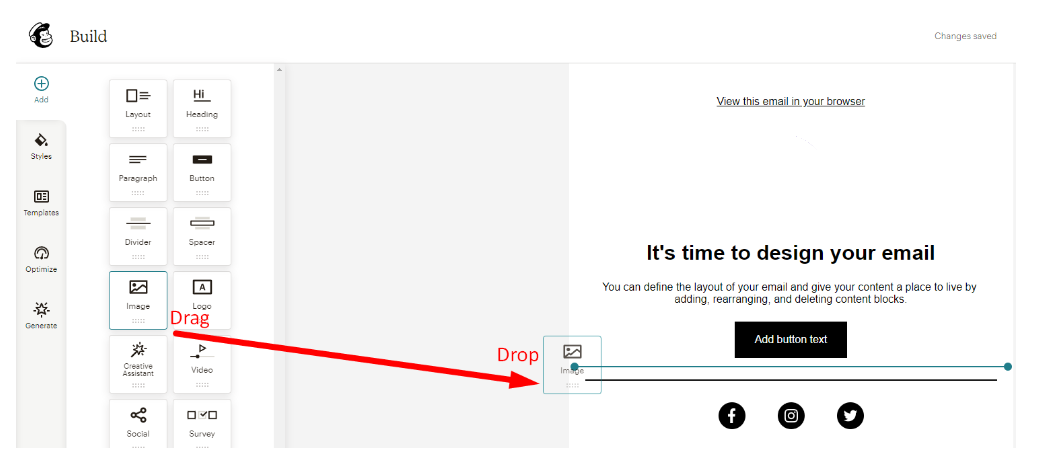
Let’s start with the downside: Mailchimp only offers 6 pre-built templates, plus 5 additional ones available for free in the “template marketplace.”
There are about 40 more templates for purchase, ranging from $6.99 to $14.99. Considering I’d already paid ₹1673 for the Standard plan to access the template marketplace, this felt a bit odd.
The extra templates are well-designed, highly customizable, and mobile responsive, but charging for them isn’t common in the industry. For example, ActiveCampaign offers over 250 high-quality templates at no extra cost.
Despite this hiccup, I’m glad I didn’t let it put me off, because Mailchimp shines in many other areas. The platform recently upgraded its email editor, making it even more user-friendly. You can easily personalize emails using merge tags, and dynamic content allows for customized messages based on the audience.
Mailchimp also excels in A/B testing, letting you experiment with different subject lines, sender names, send times, and content to optimize performance.
Mailing Lists and Segmentation
Importing contacts is simple—whether you upload a CSV or TXT file, copy/paste, or integrate through third-party services like Zapier, Salesforce, or QuickBooks. Mailchimp’s warning about importing contacts with proper marketing permissions reflects its strong anti-spam policy.
Segmentation is key to organizing your mailing list based on subscriber behavior, enabling more targeted campaigns. While Mailchimp does offer basic tagging (e.g., opened, clicked) to categorize contacts, advanced segmentation is only available with the Premium plan, which comes at a higher cost.
This means contacts can’t be moved between lists, as Mailchimp’s audiences are siloed. However, its predictive segmentation feature compensates by analyzing data to automatically send emails to the right audience.
Landing Pages

Unlike many of its competitors, Mailchimp lets users create and publish unlimited landing pages for free. There are 9 fully customizable templates available, all featuring modern, sleek, and minimalistic designs.
Similar to the email editor, the landing page templates use an easy block system, allowing you to edit and drag-and-drop elements to fully customize your page.
All of Mailchimp’s landing page templates are mobile responsive, and switching between desktop and mobile preview mode is as simple as clicking a button. It took me under 10 minutes to create a landing page I was proud to share with my subscribers.
However, connecting your landing page to a custom domain requires a Websites & Commerce plan, which comes at an additional cost.
Automation
Mailchimp provides around 45 pre-built automations (or “journeys”) designed to help you engage your audience. You can set up simple welcome emails, send offers to users who abandoned their carts, promote cross-sell opportunities, and more. You can also create your own custom “journey” by setting rules, actions, and conditions.
The catch: Mailchimp doesn’t allow contacts to move freely between lists, which limits its automation potential compared to more advanced platforms like ActiveCampaign.
That said, this limitation isn’t necessarily a dealbreaker. Mailchimp is known for being a user-friendly and accessible email marketing service, so it makes sense that its automation features are kept simple for the average marketer. If ease of use is your priority, this shouldn’t deter you from choosing Mailchimp.
Popular Email Marketing Services
Solutions and Services
Email Marketing: Create, send, and analyze email campaigns.
Automations: Trigger emails based on user behavior or events.
Customer Journey Builder: Design personalized experiences across various channels.
Website Builder: Build and host websites with custom domains.
E-commerce Tools: Integration with stores, abandoned cart emails, and product recommendations.
Advanced Analytics: Provides data insights for improving marketing efforts.
Audience Management: Tools to manage and segment contacts
PROS AND CONS OF MAILCHIMP
Pros of Mailchimp
Use Friendly
Comprehensive Features
Good Integrations
Strong Analytics
Customer support
Cons of Mailchimp
Costly for Larger Lists
Limited Free Automation
Steep Learning Curve
Template Limitations
Deliverability Issues
Why you should consider Mailchimp?
Mailchimp is an easy-to-use marketing platform that helps businesses create and manage email campaigns. Its drag-and-drop editor and customizable templates make it simple to design professional emails, even for beginners. With advanced audience segmentation and detailed analytics, users can track performance and improve engagement.
Mailchimp also offers tools beyond email, like SMS marketing, social media ads, and landing pages. It integrates with platforms like Shopify and WooCommerce, making it a great choice for e-commerce businesses. Its automation features, such as abandoned cart emails and A/B testing, help streamline marketing efforts and boost results.
Resources
All-in-One Marketing Platform: Mailchimp offers tools for email marketing, social media advertising, landing pages, and automation, enabling businesses to manage their entire marketing strategy in one place.
Audience Management: Mailchimp provides robust audience management features, including segmentation, personalized campaigns, and analytics to track customer engagement and improve targeting.
How to Switch to Mailchimp
Switching to Mailchimp is straightforward and involves migrating your existing email marketing lists and setting up campaigns. First, sign up for a Mailchimp account if you haven’t already. Once logged in, you can import your contact lists from other platforms by navigating to the Audience section and following the steps to upload your subscriber data, either manually or via an integrated service, depending on your previous platform.
After importing your contacts, create email campaigns using Mailchimp’s drag-and-drop builder for easy template customization.
Set up email automation, audience segments, and necessary integrations, such as connecting your e-commerce store, to optimize your marketing efforts.
DELIVERABILITY |4.7| 




Your Emails Will Likely Reach Their Destination
Deliverability is a hot topic, but many make the same mistake when measuring it: they run a few quick tests, settle on a random delivery rate (like 87%), and consider it done.
At Website Planet, we take a different approach to deliverability. Standard tests introduce too many variables, making results unreliable. Instead, we focus on examining the features that improve the likelihood of your emails reaching their intended inbox.
Mailchimp’s deliverability score reflects the presence (or absence) of these features, especially when compared to competitors.
First, I checked whether Mailchimp offers DKIM authentication, which helps email providers like Gmail or Hotmail verify that emails sent in your name actually come from you—acting as a type of email signature. Mailchimp does offer DKIM authentication, and they provide a useful guide to set it up in just a few minutes.
Next, I reviewed Mailchimp’s anti-spam policy. A strong anti-spam stance is important because a poor reputation can hurt the platform’s overall deliverability. Thankfully, Mailchimp has strict anti-spam requirements that adhere to the U.S. CAN-SPAM Act.
That said, when I imported several questionable-looking contacts, Mailchimp didn’t flag them, which did lower the deliverability score I assigned it.
Affiliate marketing can also impact deliverability. Mailchimp doesn’t allow traditional affiliate marketing models (like generating leads or sales for third parties), but it does permit the use of affiliate links (collaborations between independent businesses).
Lastly, I checked if Mailchimp offers private (dedicated) IP addresses. A private IP allows you to send emails from your own domain, rather than sharing with other users, which can enhance your deliverability.
Mailchimp provides private IPs for an additional $29.95 per month, which is a very reasonable fee—many competitors charge significantly more. Unlike most platforms, Mailchimp doesn’t require you to send massive email volumes to qualify for a dedicated IP.
EASY OF USE |4.8| 




Mailchimp is praised for its user-friendly interface, making it easy for both beginners and experienced marketers to navigate. The dashboard simplifies campaign creation with drag-and-drop functionality and pre-designed templates. Extensive resources, including tutorials and guides, further enhance the user experience.
Its automation tools allow users to set up automated email sequences based on subscriber behavior, saving time and boosting engagement. Comprehensive analytics help track campaign performance effortlessly. Overall, Mailchimp’s intuitive design and robust features make it a popular choice for effective email marketing.
Getting Started with Mailchimp
Account Setup: Sign up for Mailchimp and choose a suitable plan, including a free tier for beginners.
Creating a List: Import contacts from CSV files or other platforms to build your audience.
Designing Campaigns: Use the drag-and-drop builder to create customized emails with templates, images, and buttons.
Automation Features: Set up automated workflows for tasks like welcome emails and abandoned cart reminders.
Analytics and Reporting: Use the analytics dashboard to track campaign performance and adjust strategies based on metrics.
GTMetrix
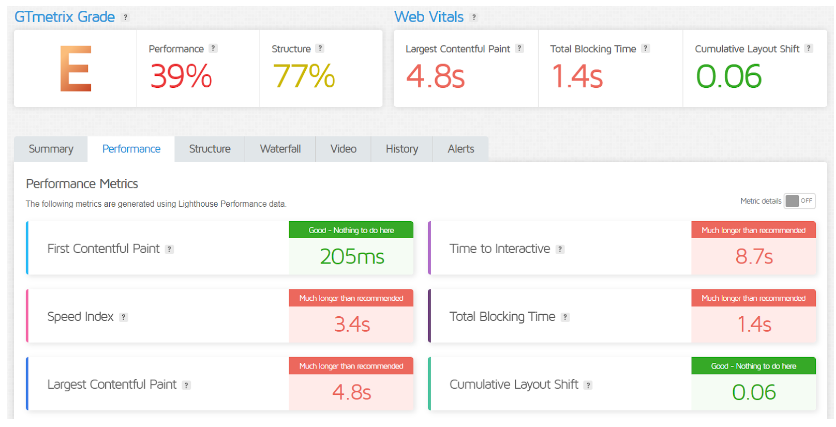
ANALYTICS & REPORTING |4.8| 




No Complaints Here – Mailchimp’s Reporting Shines
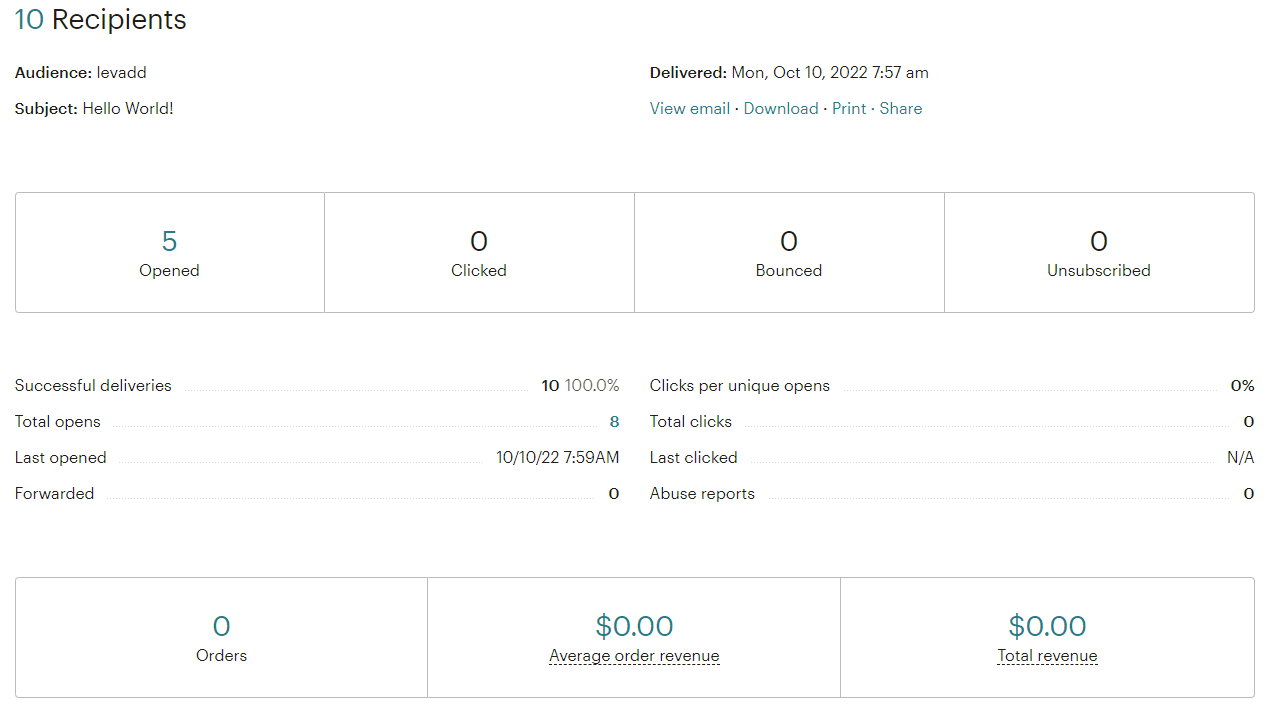
Mailchimp’s reporting features are quite advanced, even for users on the free plan. The dashboard gives a clear breakdown of how many subscribers opened, clicked, or bounced, and it also tracks the number of orders generated throughout the campaign. Everything is well-organized and easy to understand, which is exactly what you’d expect from Mailchimp.
You can also dig deeper into your campaign performance. There’s a dedicated section for link and click data, along with a 24-hour performance chart that tracks clicks and opens in real-time. The dashboard also includes insights into social performance and top geographical locations by opens.
Standard and Plus users can compare campaign performance in the “Email Analytics” section under “Campaigns,” while all users have access to “Campaign Benchmarking,” which allows you to see how your email performance stacks up against competitors.
There’s no such thing as too much data, and based on my experience, Mailchimp understands that perfectly!
SUPPORT |4.5| 




Mailchimp provides several customer support options:
Help Center: Articles on account setup, email campaigns, and more.
Knowledge Base: Guides and FAQs for troubleshooting.
Email Support: Personalized help for certain plans.
Chat Support: Real-time assistance for specific subscription tiers.
Community Forum: Connect with other users for tips and questions.
Webinars and Tutorials: Educational resources to enhance platform use.
Social Media: Reach out for support via social channels.
Security
Mailchimp prioritizes security by using industry-standard measures like TLS encryption to protect user data during transmission and storage. Their infrastructure safeguards against risks such as phishing and hacking, ensuring secure data handling for millions of users.
To enhance account protection, Mailchimp offers multi-factor authentication (MFA), requiring an additional verification method beyond passwords. They also monitor account activity, sending alerts for any suspicious behavior to help users respond quickly to potential threats.
Mailchimp complies with global data protection regulations, including GDPR and CCPA, offering tools to manage consent and ensuring email campaigns remain secure and lawful.
PRICING |4.5| 




Plan | Monthly Price | Contacts Included | Features |
Free | $0 | Up to 500 contacts | Basic email marketing, landing page builder, up to 2,500 emails per month, single-step automations. |
Essentials | Starting at $13 | Up to 50,000 contacts | Custom branding, 24/7 support, A/B testing, three audiences, simple automation features. |
Standard | Starting at $20 | Up to 100,000 contacts | Advanced segmentation, multi-step automation, real-time reporting, and send time optimization. |
Premium | Starting at $350 | 200,000+ contacts | Unlimited audiences, advanced analytics, multivariate testing, increased user access. |
Pay-As-You-Go | Varies | Flexible | Purchase email credits in blocks, access to Essentials features without a monthly commitment. |
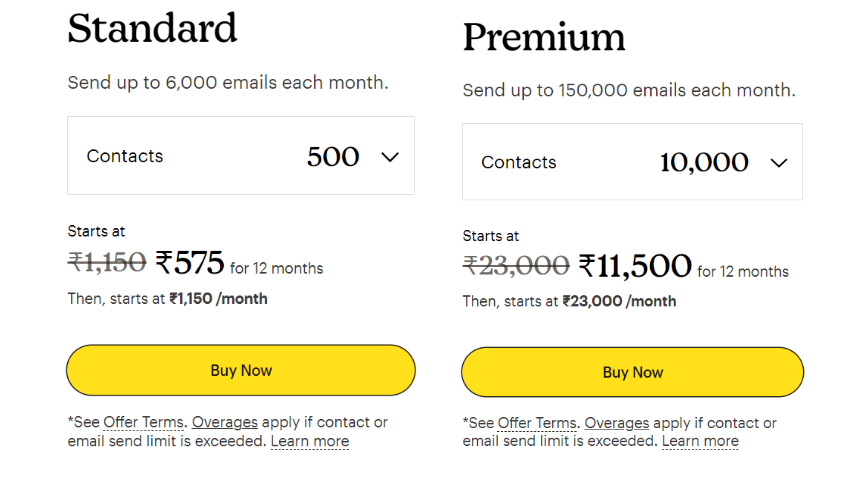
Not All Mailchimp Plans Are Created Equal
Mailchimp offers four tiers of service, including a free-forever plan. The free plan provides basic tools to create email campaigns and manage a small audience, but it has significant limitations when it comes to personalization, automation, and support.
The Essentials plan is the cheapest paid option, offering access to some core features like A/B testing and email scheduling. However, I’m not a big fan of this plan since it restricts many advanced features such as custom templates, dynamic content, and send-time optimization—key tools for boosting the effectiveness of your campaigns. These advanced features are unlocked with the Standard plan.
If you’re considering a paid plan, it’s worth spending a little extra to get the Standard plan—it offers a much better value.
As for the Premium plan, it includes some helpful additions (like phone support), but its high price makes it impractical for most marketers. Unless you need the additional 145,000 email sends per month, the Standard plan is more than enough.
While some of Mailchimp’s add-ons, like dedicated IPs, are reasonable, it’s frustrating that I have to pay extra for features like premium templates and connecting a custom domain, even as a paying customer. Other platforms, like ActiveCampaign, include these features in their paid plans.
Mailchimp
FREE
₹0
/MONTHS
Mailchimp
ESSENTIALS
₹1088
/MONTHS
Number of emails per month: 5,000
Number of subscribers: 50,00
Multi-user accounts: 1
Automation
Mailchimp
STANDARD
₹1673
/MONTHS
Mailchimp
FREE
₹0
/MONTHS
Mailchimp
ESSENTIALS
₹1088
/MONTHS
Number of emails per month: 5,000
Number of subscribers: 50,000
Multi-user accounts: 1
Automation
Mailchimp
STANDARD
₹1673
/MONTHS
Mailchimp Alternatives
Frequently Asked Question.
Mailchimp is an all-in-one marketing platform that helps businesses manage email marketing, automation, audience management, and data analytics for building stronger customer relationships.
Mailchimp offers different pricing tiers: Free, Essentials, Standard, and Premium. Each tier comes with varying features, user limits, and email sends per month. The Free plan allows up to 500 contacts, while paid plans increase that limit and unlock more advanced tools.
Mailchimp is suitable for small businesses, startups, non-profits, and large enterprises. It is particularly beneficial for companies looking to streamline their marketing efforts, build automated campaigns, and manage email marketing.
Yes, Mailchimp offers powerful automation features such as welcome series, abandoned cart emails, product recommendations, and birthday messages to help businesses engage their audience based on specific triggers.
Mailchimp integrates with hundreds of apps and platforms such as Shopify, WordPress, Google Analytics, and social media platforms like Facebook and Instagram
Mailchimp allows you to segment your audience based on behavior, purchase history, demographics, and custom criteria. This segmentation helps create more personalized and effective marketing campaigns.
Yes, Mailchimp provides A/B testing (also known as split testing) to compare different versions of your emails or campaigns. You can test variables like subject lines, content, and send times to optimize your performance.
Yes, Mailchimp offers a landing page builder that allows you to create high-converting pages to capture leads, promote products, and grow your audience.
Mailchimp provides detailed reporting on campaign performance, including open rates, click-through rates, conversion tracking, and revenue generated. You can also integrate with Google Analytics for more insights.
You can easily import contacts into Mailchimp by uploading a CSV or TXT file, copy-pasting from a spreadsheet, or syncing contacts from integrated platforms like Shopify or Salesforce.
Yes, Mailchimp is GDPR compliant. It offers tools to help businesses manage and maintain GDPR compliance, such as customizable signup forms, consent checkboxes, and audience data management.
Mailchimp provides various support options, including email support, live chat for paid plans, and a comprehensive knowledge base. Premium plans offer phone support as well.







